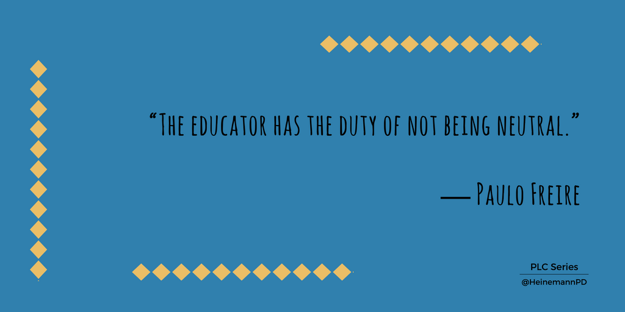-1.jpg)
Welcome back to the Heinemann Professional Development Professional Learning Community (PLC) series. We are excited to present a new format for the 2017-2018 year!
Each month, we'll share 2 posts designed to provoke thinking and discussion, through a simple framework, incorporating mini-collections of linked content into your professional development time.
♦♦♦♦
This month, our posts will support critical thinking, self-examination, and crucial discussion about our responsibility as educators to strive for social justice.
♦♦♦♦
by Jaclyn Karabinas
![]()
Connect
Exploring the meaning of the words “duty” and “neutrality” in the context of your role in education will call upon you to examine and articulate your belief systems. Make a list of what comes to mind when you consider your definition of duty in education. Make a list of instances where you find yourself seeking a “safe zone” of neutrality.
![]()
Consider
Hold this guiding question in your mind as you listen, read, and discuss the resources related to advocacy: How is my duty to be an advocate for my students challenged by my own intimidation, discomfort, or life experiences?
![]() Educate
Educate
Read Why #BlackLivesMatter in Your Classroom Too by Cornelius Minor. Try to capture your thinking, questions, reactions, and phrases that require more consideration.
![]()
Reflect
How does the claim of neutrality actually side with the powerful over the powerless?
In his article, Cornelius poses the question: What is our influence, as educators? Spend a few moments writing and talking about these statements with colleagues.
![]()
Practice
Cornelius writes, “Becoming more systemically aware means understanding the kinds of racism that shape our communities, schools, and classrooms, and where we stand in relation to those social forces.”
Whether systems oppress and isolate students based on their race, ethnicity, gender, orientation, language, or any aspect of identity, Cornelius’ words prompt us to accept our duty to become systemically aware in order to be advocates for all students and “disrupt the status quo by asking ourselves questions about our practice, community and curriculum.”
Gather some colleagues and take some time to list and talk about who is included and who is excluded in the following elements of your school: safety, choice, voice, growth, flexibility. If you are struggling with finding who might be excluded due to the limits of your own experiences, take to social media to gather a wider perspective.
![]()
Extend
Listen to a podcast (14:12) with Cornelius Minor where he talks about how practices and acts upon this statement: "We may not have the answers for every situation we face, but we can’t choose to do nothing."
- Podcast Episode (transcript available): Being an Advocate for your Students
Read the article below from the 2017 Heinemann PD Catalog Journal Article by Heinemann Fellow Kimberly Parker. How does Kim’s belief in choice create a literacy classroom of inclusion over exclusion?
- Reaching the Brilliant and Bored: Centering the Literacy Lives of Young People of Color in Our Classrooms by Kimberly Parker
![]()
Refine
Consider your list of those excluded from the elements of safety, choice, voice, growth, flexibility from the earlier activity. Where will you begin your disruption? What resources, organizations, experienced colleagues, or conversations will you need to practice?
Revisit your guiding question: How is my duty to be an advocate for my students challenged by my own intimidation or discomfort?
![]()
Act
Based on what you discovered through your listing, thinking, and reading, do your research to find what you need to prepare or practice for advocating for a student or subset of students. Find someone doing similar work to learn from through blogs, conversations, and social media. To gather perspective through a wider variety of life experiences, read something (as teacher and author Sara Ahmed once advised) “by someone who doesn’t look like you.”
>>> For Further Reading:
- PLC Series September Post #1: Our Responsibility to Strive for Social Justice
- If You Think You’re Giving Students of Color a Voice, Get Over Yourself by Jamila Lyiscott
- Reaching At-Risk Students by Establishing Strong Connections By Paul Hernandez
- Upstanders: How to Engage Middle School Hearts and Minds with Inquiry by Sara Ahmed and Smokey Daniels



